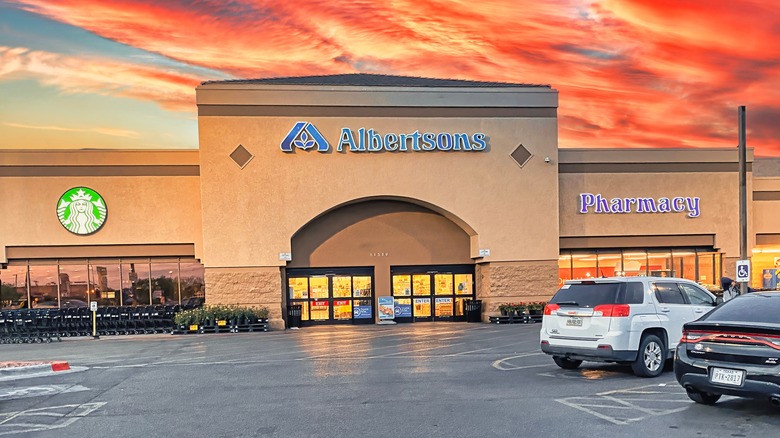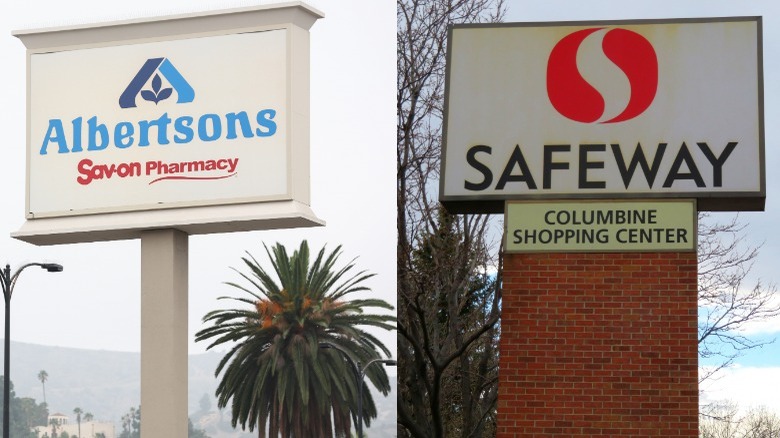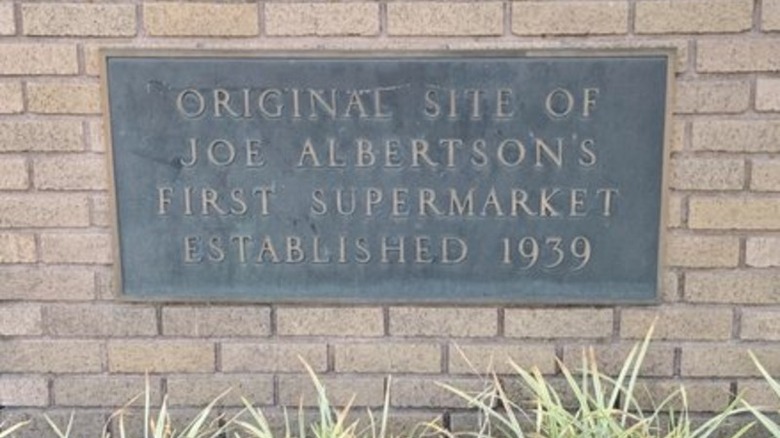The Monumental History Behind Albertsons' First Store
In the midst of the busy holiday season that closes out each year, one of the biggest U.S. business mergers in recent memory might have escaped your attention. In October 2022, Kroger, America's second-largest grocer after Walmart, announced a deal to acquire Albertsons, the nation's fourth-largest grocer after Walmart, Kroger, and Costco. CNBC reports that Kroger is forking over $24.6 billion for the merger. What makes this so impactful is the number of grocery stores that had already been merged under those two brands. According to Supermarket News, Kroger owns 22 chains, including Ralphs, Fred Meyer, Fry's, King Soopers, Food 4 Less, and its namesake brand. Albertsons owns 13 chains, including Safeway, Vons, Tom Thumb, Pavilions, and Acme. This monumental merger means that shopping at any of those 35 grocery chains will ultimately send money to the same set of pockets.
As of the writing of this article, the Kroger-Albertsons merger is not complete. CNN reports that it probably won't be finalized until 2024. There are antitrust concerns at play, and the new megabrand may need to appease the Federal Trade Commission through divestitures, which could result in significant job losses. However, assuming the deal does go through, Kroger will own a nearly 16% share of the grocery market (still trailing Walmart's 20.9%), according to CNBC. It would also mark the final chapter in Albertsons' remarkable rise to grocery dominance, beginning with a single store built on betrayal, ice cream, and a very generous auntie.
Albertsons was founded by a Safeway employee
There are Albertsons stores all over the country, but Idaho is its home base. Not only is Meridian, Idaho home to the world's largest Albertsons, but the chain's very first store was built in Boise. It was founded in 1939 by Joe Albertson, a Safeway. According to Supermarket News, the chain sent Albertson to Idaho to oversee the opening of a new location. Instead, he started a competing brand that ultimately bought out his former employer. (Say what you will about loyalty; sometimes, it pays to look out for yourself.) Albertson had bold ideas that would ultimately revolutionize the grocery industry.
According to PBS, the original Albertsons in Boise implemented a number of innovations that were unprecedented in the grocery business at that time. These included free parking on-site and a money-back guarantee. The store also made ice cream and doughnuts. Albertsons barely got off the ground, though — when Joe decided to open the store, he only had $5,000 to spare. Per Supermarket News, he partnered with L.S. Skaggs, another ex-Safeway employee, and his accountant Tom Cuthbert. But even then, Joe was short $7,500. He turned to his wife's aunt, who graciously offered up the money, and Joe kept a photo of her in his office from there on out.
There's a monument at the original Albertsons site
Another thing that makes Albertsons' origin story so remarkable is that the United States was just barely beginning to recover from the Great Depression at the time the first store opened in 1939. According to Britannica, economic production didn't return to pre-Depression levels until 1942. However, Joe Albertson was able to open three additional stores within two years of the first. According to Money Inc, he focused expansion efforts on towns within the Boise region, and there was a unique method by which he chose new locations. Albertson would drive through different neighborhoods looking for homes with lots of children's clothing hanging on their clotheslines. This would indicate whether there were many families living in the area. More families meant more mouths to feed and more demand for groceries.
The original Albertsons in Boise was demolished in 1979, according to local news station KTVB7. Another replacement store was built on the site, as well as a monument commemorating the original. (Well, monument might be a bit of a generous term, as it's just a tiny brick marker.) Look closely for it at the corner of 16th and State streets in the city's downtown area.
Supermarket News reports that Joe Alberston died in 1993, and interestingly enough, the chain's success proved to be a double-edged sword for him. He much preferred working in the stores over his executive desk job, saying, "All you get sitting behind a desk is problems."


